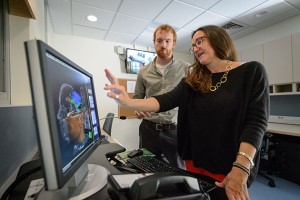Communication is key. This phrase can apply to any number of contexts: at work, school, and in our personal relationships. But for the 40 million Americans with communication disorders, for one reason or another, something goes wrong that prevents them from being able to communicate normally.
Understanding what causes these disorders and what could be done to help treat them is a critical area for research. Given the need to continue encouraging and developing researchers entering this field, University of Connecticut professors Emily Myers and Inge-Marie Eigsti have received a five-year training grant from the National Institute on Deafness and Other Communication Disorders to train a cohort of graduate students and postdoctoral fellows in communication disorder research skills and methods.
This grant will enable the mentorship team, which also includes Professors Richard Aslin, Deborah Fein, Roeland Hancock, Fumiko Hoeft, Nicole Landi, Jim Magnuson, Jay Rueckl, Erika Skoe, and Rachel Theodore, to work with a cohort of 10 predoctoral trainees and five postdoctoral trainees, helping them develop skills and expertise necessary to become productive researchers studying communication disorders.

Trainees will participate in crash courses emphasizing specialized skills and external workshops to support advanced methods training. The team of researchers who will be training the cohort is drawn from a range of disciplines in psychology and speech, language and hearing sciences.
“The team has a strong track record of impactful research on typical and atypical communication, and of mentoring productive scientist trainees at the predoctoral and postdoctoral levels,” Eigsti and Myers say.
Communication disorders have a variety of sources and causes including hearing loss, developmental disorders such as autism, dyslexia, or developmental language disorder; they can also be the result of a traumatic brain injury or aphasia – the loss of the ability to understand or express speech as the result of a brain injury.
All of these causes are rooted in neurological functions and so one of the most valuable skills “Training in Cognitive Neuroscience of Communication” will teach this group of trainees is techniques in neuroimaging. Being able to see how the brains of people with communication disorders are working gives insights into communication that cannot be fully appreciated simply by listening to people talk.
“A unique part of this program is that our trainees will get unusual access to neuroimaging techniques like fMRI and EEG,” Myers says. “These methods give researchers insights into the differences in brain structure and function of people with communication disorders.”
Through this traineeship, the students will be able to interact not only with scientists working in this field, but also with individuals who have communication disorders.
“In order to make real progress in helping people with communication disorders, we feel it’s important for students to learn what it’s like to experience dyslexia, aphasia, or hearing loss, for instance,” Myers says.
Eigsti emphasizes the importance of trainees coming away from this program with both technical and clinical experience.
“So far, scientists who get excellent training in brain imaging too often have limited contact with people with actual communication disorders; and, on the other hand, clinically oriented scientists, who see patients struggling with communication challenges too often have limited training in brain imaging,” Eigsti says. “We hope to address this training gap in both directions.”
This program will leave these 15 trainees equipped with a toolbox well-stocked with skills and knowledge, poised to make significant progress in the study of communication through their own future research.
The Ruth L. Kirschstein Institute National Research Service Award training program enables institutions to recruit individuals for pre- and postdoctoral research training in specified shortage areas. The program helps prepare qualified trainees for careers that have a significant impact on the health-related research needs of the nation.
Inge-Marie Eigsti received her Ph.D. in clinical psychology and brain and cognitive sciences from the University of Rochester in 2001. Her research focuses on mapping complex behavioral constructs onto mechanism processes in the brain as it relates to the study of Autism Spectrum Disorder. Her lab works to better understand the communication challenges of people with ASD across multiple levels: from genes to brain to behavior.
Emily Myers received her Ph.D. in cognitive science from Brown University in 2005. The research in her lab focuses on speech perception, cognitive neuroscience of speech and language, aphasia, and second-language acquisition. Her lab uses neuroimaging methods and standard psycholinguistic measures to understand the neural and behavioral mechanisms underlying these processes.



